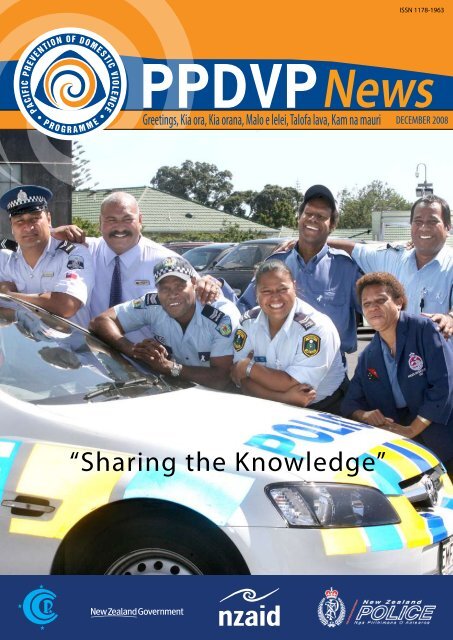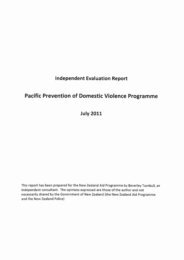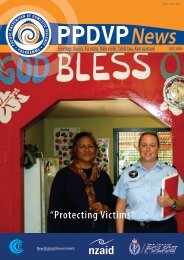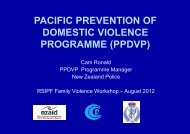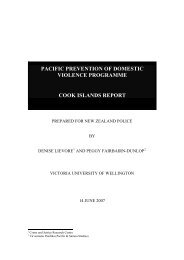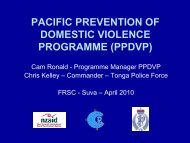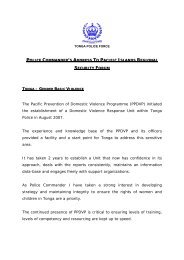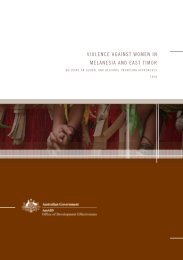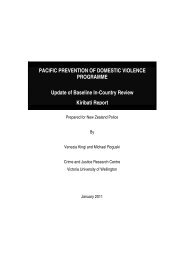“Sharing the Knowledge” - Pacific Prevention of Domestic Violence ...
“Sharing the Knowledge” - Pacific Prevention of Domestic Violence ...
“Sharing the Knowledge” - Pacific Prevention of Domestic Violence ...
Create successful ePaper yourself
Turn your PDF publications into a flip-book with our unique Google optimized e-Paper software.
ISSN 1178-1963<br />
News<br />
DECEMBER 2008<br />
<strong>“Sharing</strong> <strong>the</strong> <strong>Knowledge”</strong>
Programme update<br />
Welcome to ano<strong>the</strong>r edition <strong>of</strong> <strong>the</strong> PPDVP News. It has become<br />
a bit <strong>of</strong> a best seller as we now distribute over 500 copies around<br />
<strong>the</strong> region.<br />
The PPDVP has started to work with <strong>the</strong> Vanuatu Police Force<br />
who have joined <strong>the</strong> programme as a participating country.<br />
We have included a “bio” for <strong>the</strong> new Vanuatu mentor,<br />
Alan McGlade <strong>of</strong> Hamilton. We also welcome an additional<br />
reserve mentor, Sue O’Neill, from <strong>the</strong> Central Police District in<br />
New Zealand. You will see that <strong>the</strong>y both have a wide range<br />
<strong>of</strong> experience that enhances our overall skills base for <strong>the</strong><br />
programme. Welcome to Alan and Sue.<br />
The Case Management and Intelligence System (CMIS) database<br />
from Jade S<strong>of</strong>tware is in place in a number <strong>of</strong> countries and going<br />
well. The take-up by staff has been excellent and <strong>the</strong>ir knowledge<br />
<strong>of</strong> <strong>the</strong> number and range <strong>of</strong> domestic violence cases is increasing<br />
through <strong>the</strong> use <strong>of</strong> this tool. The Cook Islands Police are using<br />
it throughout <strong>the</strong>ir police service and <strong>the</strong> overall feedback from<br />
<strong>the</strong>m has been excellent.<br />
This edition includes an article about <strong>the</strong> annual DV training<br />
course, which was held in Tonga in June. The focus was around<br />
investigating reports <strong>of</strong> domestic violence and ga<strong>the</strong>ring <strong>the</strong><br />
best possible evidence to support <strong>the</strong> prosecution <strong>of</strong> <strong>of</strong>fenders.<br />
The <strong>Pacific</strong> Islands Chiefs <strong>of</strong> Police (PICP) met in Samoa in<br />
September. The PICP continue to <strong>of</strong>fer <strong>the</strong>ir support to <strong>the</strong><br />
PPDVP, and we have seen some clear instances <strong>of</strong> this. In PNG, <strong>the</strong><br />
Commissioner has taken a firm line on cases where his staff have<br />
assaulted <strong>the</strong>ir partners and we congratulate him on this. A group<br />
<strong>of</strong> <strong>the</strong> Micronesian Chiefs <strong>of</strong> Police have asked for assistance.<br />
This will be assessed and hopefully occur early next year.<br />
In November, we will join with <strong>the</strong> <strong>Pacific</strong> Islands Law Officers<br />
Network (PILON) and NZ Crown Law who facilitate an annual<br />
training course for prosecutors in litigation skills. The course now<br />
includes a DV component using material from <strong>the</strong> investigations<br />
course syllabus. Five police prosecutors will attend <strong>the</strong> training<br />
in Vanuatu. We are also planning a basic prosecutions training<br />
course for about eight police prosecutors in April or May next<br />
year in Auckland. The NZ Police Prosecutions Service is working<br />
with <strong>the</strong> PPDVP on this.<br />
A senior investigator from Papua New Guinea spent ten days<br />
in Auckland on a domestic and family violence study tour.<br />
This edition includes some extracts from his report, and <strong>the</strong><br />
lessons he learnt. It was a very useful tour and one that we will<br />
look to repeat.<br />
The PPDVP Team <strong>of</strong>fers you all our best wishes for <strong>the</strong> end <strong>of</strong> <strong>the</strong><br />
year and <strong>the</strong> Christmas and festive seasons, and we hope that<br />
you have some quality time with your families and friends.<br />
Cam Ronald<br />
2<br />
Cover Photo: <strong>Pacific</strong> participants attending <strong>the</strong> Auckland Study tour<br />
in November 2008. Photo: John Selkirk, Dominion Post.<br />
Understanding<br />
<strong>the</strong> <strong>Pacific</strong><br />
The New Zealand Police<br />
Commissioner recently commented<br />
on <strong>the</strong> challenges <strong>of</strong> policing <strong>the</strong><br />
pacific. Commissioner Howard<br />
Broad spoke <strong>of</strong> providing assistance<br />
Cam Ronald<br />
to o<strong>the</strong>r police services, and<br />
he noted “Inevitably, <strong>the</strong> first step is to develop <strong>the</strong> trust and<br />
confidence between donor and recipient - that is <strong>the</strong> basis <strong>of</strong> all<br />
human interactions.”<br />
“When I sit down and talk with my counterparts from across <strong>the</strong><br />
<strong>Pacific</strong>, once I have <strong>the</strong>ir confidence that I understand <strong>the</strong>m as<br />
human beings, that we have <strong>of</strong>fered each o<strong>the</strong>r <strong>the</strong> respect due<br />
each o<strong>the</strong>r, and this includes overcoming an inherent shyness on <strong>the</strong><br />
part <strong>of</strong> <strong>Pacific</strong> people, <strong>the</strong>y have plenty to say about <strong>the</strong>ir needs. “<br />
The Commissioner concluded his commentary with “Sometimes<br />
going to places like Samoa, <strong>the</strong> Solomons, Timor Leste and<br />
Rarotonga points out to us that regardless <strong>of</strong> <strong>the</strong> operating<br />
environment <strong>the</strong> principles <strong>of</strong> decent policing are <strong>the</strong> same.”<br />
These comments struck a chord with <strong>the</strong> various activities that<br />
make up <strong>the</strong> PPDVP. At <strong>the</strong> recent <strong>Pacific</strong> Islands Chiefs <strong>of</strong> Police<br />
(PICP) meeting in Samoa a group <strong>of</strong> <strong>the</strong> Micronesian chiefs <strong>of</strong> police<br />
raised <strong>the</strong> need for support around domestic violence knowledge,<br />
understanding and training in <strong>the</strong>ir three countries. Each has<br />
diverse needs but <strong>the</strong> underlying <strong>the</strong>me is that <strong>the</strong>y wish to do <strong>the</strong><br />
best for <strong>the</strong>ir people, and to deal with <strong>the</strong>se crimes and <strong>the</strong> harm<br />
<strong>the</strong>y cause.<br />
Providing assistance to <strong>the</strong> countries in Micronesia is no simple<br />
matter - most <strong>of</strong> <strong>the</strong>m are at least two days travel from New Zealand,<br />
<strong>of</strong>ten meaning up to four “sometimes connecting” flights each way,<br />
and <strong>the</strong> countries <strong>the</strong>mselves are mostly made up <strong>of</strong> a series <strong>of</strong><br />
small communities on scattered islands. The PPDVP will listen to <strong>the</strong><br />
local police, discuss <strong>the</strong>ir problems and see how we can help <strong>the</strong>m<br />
over <strong>the</strong> next few months.<br />
At <strong>the</strong> time that this edition <strong>of</strong> <strong>the</strong> PPDVP News reaches you, a<br />
series <strong>of</strong> gender based violence surveys in <strong>the</strong> Solomon Islands and<br />
Kiribati will have been released. The picture painted in <strong>the</strong>se two<br />
surveys is not a pretty one with extremely high levels <strong>of</strong> violence,<br />
both physical and sexual, committed against women by <strong>the</strong>ir<br />
partners and within <strong>the</strong>ir communities. These surveys will bring a<br />
spotlight on to <strong>the</strong> pacific. The PPDVP is responding to identify ways<br />
in which we assist <strong>the</strong> local police to reduce harm to <strong>the</strong> victims,<br />
<strong>the</strong>ir families and society.<br />
The programme welcomes any comments/contributions<br />
to <strong>the</strong> newsletter. If you wish to make comment,<br />
please direct to Kim Woon (Support Officer, PPDVP),<br />
Level 4 - PPDVP / ISG New Zealand Police Headquarters,<br />
180 Molesworth Street, Wellington, New Zealand or<br />
email kim.woon@police.govt.nz DDI 64 4 4707373,<br />
Cell 64 021 224 3526. Fax: 64 4 4749540.
Farewell to old friends and Welcome to New Members<br />
The Programme acknowledges <strong>the</strong> work <strong>of</strong> past members and<br />
welcomes its newest members:<br />
Assistant Chief Inspector Lutoviko Manu formally <strong>the</strong> head <strong>of</strong> <strong>the</strong><br />
Tonga Police DV unit, resigned from <strong>the</strong> Tonga Police service earlier<br />
this year. Manu had been with <strong>the</strong> PPDVP since <strong>the</strong> commencement<br />
<strong>of</strong> <strong>the</strong> programme and he was <strong>the</strong>refore very much one <strong>of</strong> “our team”<br />
across <strong>the</strong> pacific and a key member <strong>of</strong> our overall knowledge group.<br />
He was a key figure in <strong>the</strong> development <strong>of</strong> <strong>the</strong> domestic violence<br />
unit in Tonga and part <strong>of</strong> <strong>the</strong> team that developed <strong>the</strong> first domestic<br />
violence training curriculum delivered to <strong>Pacific</strong> Police in Auckland in<br />
April 2007. We wish him well as he moves on to a new career.<br />
The new <strong>of</strong>ficer in Charge <strong>of</strong> <strong>the</strong> Tonga DV Unit is Detective Sergeant<br />
Seteone Poutele, he is well respected within <strong>the</strong> Tonga Police Service<br />
and brings a wide range <strong>of</strong> skills to <strong>the</strong> position, Seteone was part<br />
<strong>of</strong> <strong>the</strong> team <strong>of</strong> experts from <strong>the</strong> <strong>Pacific</strong> whom ga<strong>the</strong>red in Tonga to<br />
develop <strong>the</strong> Investigative Training Curriculum which was delivered to<br />
<strong>Pacific</strong> Police Officers in Tonga in June 2008.<br />
The programme also wishes to record our thanks to Sergeant Rebecca<br />
Ellis Hoskings formally <strong>the</strong> head <strong>of</strong> <strong>the</strong> Cook Islands domestic violence<br />
unit Rebecca, like Manu in Tonga, had been with <strong>the</strong> PPDVP since <strong>the</strong><br />
commencement <strong>of</strong> <strong>the</strong> programme. Rebecca is a well known identity<br />
in <strong>the</strong> Cook Islands and was instrumental in developing partnerships<br />
and opening a number <strong>of</strong> doors for <strong>the</strong> programme in <strong>the</strong> Cook<br />
Islands. Rebecca retains her role as <strong>the</strong> chair <strong>of</strong> <strong>the</strong> Woman’s Advisory<br />
Network (WAN) for woman police <strong>of</strong>ficers in <strong>the</strong> <strong>Pacific</strong> and will be a<br />
great sounding board for <strong>the</strong> new Unit O/C.<br />
Senior Constable Pauline Rangi takes over <strong>the</strong> reigns from Rebecca.<br />
Pauline was part <strong>of</strong> a small team <strong>of</strong> <strong>of</strong>ficers that attended <strong>the</strong> CMIS<br />
database training in April 2008 in Rarotonga run by <strong>the</strong> PPDVP.<br />
New PPDVP Mentors<br />
Sergeant Alan McGlade from Hamilton Police, and Senior Sergeant<br />
Sue O’Neil from Palmerston North Police, have joined <strong>the</strong> PPDVP<br />
programme and are both welcome additions.<br />
Alan McGlade<br />
Alan joined <strong>the</strong> Police in 1992<br />
and was involved at <strong>the</strong> start in<br />
<strong>the</strong> Hamilton Abuse Intervention<br />
Pilot Project, in association with<br />
<strong>the</strong> Police “pro-arrest” practise as<br />
a frontline member. After several<br />
years on frontline sectional work,<br />
he moved to Hamilton East<br />
Community Policing Centre, and<br />
later to Hamilton City and joined Alan McGlade<br />
<strong>the</strong> CIB. He worked on <strong>the</strong> Hamilton<br />
Child Abuse Team (CAT) for <strong>the</strong> next five years, becoming <strong>the</strong> senior<br />
detective and relieving O/C on <strong>the</strong> team on a regular basis. He has<br />
focused on building awareness and educating NGOs and Government<br />
organisations about child abuse and <strong>the</strong> work <strong>of</strong> <strong>the</strong> CAT <strong>of</strong>fice by<br />
preparing and presenting various training programmes, information<br />
leaflets and point <strong>of</strong> contact details. He was relieving O/C CIB at Huntly<br />
for three months before moving onto <strong>the</strong> Waikato Law Enforcement<br />
Team as <strong>the</strong> sole detective and relieving O/C, where he dealt with<br />
burglaries, property <strong>of</strong>fending and drug <strong>of</strong>fences.<br />
In 2005 he became <strong>the</strong> Officer In Charge (O/C) <strong>of</strong> <strong>the</strong> newly launched<br />
Family Safety Team (FST). He is working extensively with government<br />
and non-government agencies building on <strong>the</strong> existing networks,<br />
promoting and educating on Family <strong>Violence</strong>, and striving for best<br />
practise in all areas <strong>of</strong> response to families in crisis. The FST focuses<br />
on providing supervision, guidance and training preparation and<br />
presentation involving all collaborating partners in <strong>the</strong> area <strong>of</strong><br />
Family <strong>Violence</strong>.<br />
Sue O’Neil<br />
Sue joined <strong>the</strong> Police in 1991 and was<br />
posted to Wanganui. She qualified<br />
as a Detective and has worked<br />
on a wide range <strong>of</strong> serious crime<br />
investigations, but her passion is in<br />
<strong>the</strong> area <strong>of</strong> child abuse investigations<br />
and she is a qualified specialist child<br />
interviewer. Sue was promoted to<br />
Sergeant on sectional duties before<br />
becoming a Police prosecutor. After Sue O’Neil<br />
15 years in Wanganui, Sue transferred<br />
to Palmers ton North being promoted to Senior Sergeant in charge <strong>of</strong><br />
Operations. The role included <strong>the</strong> Family <strong>Violence</strong> portfolio, Officer in<br />
Charge <strong>of</strong> Youth, Community Group, Dogs, Briefing Centre and Court<br />
Orderly. Also attached to <strong>the</strong> role were Neighbourhood Support, Ethnic<br />
Communities, Community Patrols, Tertiary and Korowai Kahui (Maori<br />
advisory group). Although extremely challenging, <strong>the</strong> diversity ensured<br />
that it remained interesting. Sue enjoys working with <strong>the</strong> community,<br />
particularly ethnic communities and refugees, which forms a large part<br />
<strong>of</strong> her work. Sue has worked closely with <strong>the</strong> Congolese, Burmese, and<br />
recently <strong>the</strong> Bhutanese, communities.<br />
“I had <strong>the</strong> pleasure <strong>of</strong> traveling to Fiji with Kim, Soni and Alan where<br />
we met with many people from around <strong>the</strong> <strong>Pacific</strong> who work in <strong>the</strong><br />
area <strong>of</strong> Family <strong>Violence</strong>. I was amazed to see <strong>the</strong> number <strong>of</strong> different<br />
agencies and <strong>the</strong> range <strong>of</strong> work that was being carried out. The trip<br />
provided an ideal opportunity for networking and gaining knowledge<br />
<strong>of</strong> what is going on out <strong>the</strong>re. I am looking forward to getting into this<br />
role in PPDVP and working with Police around <strong>the</strong> <strong>Pacific</strong>. I hope <strong>the</strong><br />
experience and knowledge that I have gained over <strong>the</strong> years will be <strong>of</strong><br />
benefit to <strong>the</strong> people <strong>of</strong> <strong>the</strong> <strong>Pacific</strong>”.<br />
3
Regional<br />
Tal<strong>of</strong>a lava, Malo e lelei, Fakal<strong>of</strong>a lahi atu, Nisa bula vinaka, Num estae,<br />
Kia orana, Kia ora tātou and warm <strong>Pacific</strong> greetings.<br />
The PPDVP is a unique programme in <strong>the</strong> sense that what is being<br />
advocated is a whole <strong>of</strong> ‘<strong>Pacific</strong> Policing’ approach to responding to<br />
domestic violence, and having consistent processes and procedures<br />
as well as a common view towards domestic violence being a crime<br />
and not a private matter and while each <strong>Pacific</strong> Policing organisation<br />
will have reached different levels <strong>of</strong> response <strong>the</strong> fact that we have<br />
all reached a level <strong>of</strong> agreement that has led to <strong>the</strong> signing <strong>of</strong> a<br />
Declaration between <strong>Pacific</strong> Police Chiefs against domestic violence, is<br />
a major step forward.<br />
The programme has been privileged to meet and work with many<br />
<strong>of</strong>ficers from o<strong>the</strong>r <strong>Pacific</strong> Police Services, local and Regional NGO’s,<br />
and community organisations. It has shared laughter and understood<br />
<strong>the</strong> tears shed by some very committed and passionate people,<br />
including police <strong>of</strong>ficers who have been moved by a personal<br />
experience or recognised ano<strong>the</strong>rs personal journey, heard stories<br />
told by children and wondered about <strong>the</strong>ir future, marvelled at <strong>the</strong><br />
triumph <strong>of</strong> o<strong>the</strong>rs in trying circumstances, and in <strong>the</strong>ir own success<br />
stories. These experiences have both inspired and motivated <strong>the</strong><br />
programme to move fur<strong>the</strong>r ahead to move this very important issue<br />
forward.<br />
The challenge continues as <strong>the</strong> programme is nearing its third year <strong>of</strong><br />
deployments.<br />
While many well-established non-government agencies and<br />
community organisations in <strong>the</strong> <strong>Pacific</strong> Region have been tackling this<br />
issue for some time, Police agencies around <strong>the</strong> world including <strong>the</strong><br />
<strong>Pacific</strong> region, are steadily continuing to build <strong>the</strong>ir own capacity and<br />
are making good inroads into responding more effectively to reported<br />
incidences <strong>of</strong> domestic violence.<br />
We are now seeing <strong>the</strong> benefits <strong>of</strong> a developed process <strong>of</strong> ga<strong>the</strong>ring<br />
information on domestic violence both within and outside <strong>of</strong> police<br />
organisations. In particular CMIS is being used to better inform police<br />
managers, more arrests are being made, repeat <strong>of</strong>fending identified<br />
and a zero tolerance by <strong>of</strong>ficers towards domestic violence <strong>of</strong>fending.<br />
While <strong>the</strong>se are things that are developed and being developed, we<br />
are seeing attitudes changing, albeit slowly and as Cam (Programme<br />
Manager) keeps saying: “It won’t happen overnight, but it will happen”.<br />
The Regional programmes continue to move forward and we warmly<br />
welcome Vanuatu in joining <strong>the</strong> programme as <strong>the</strong> fifth participating<br />
country and at <strong>the</strong> same time, new mentor Alan McGlade from <strong>the</strong><br />
Hamilton policing region in New Zealand who is assigned to Vanuatu.<br />
Commissioner Patu Lui is a strong advocator for <strong>the</strong> programme and<br />
we are thankful for his continued support as has Mr Jeff Langley (NZ<br />
High Commissioner) to Vanuatu.<br />
The second ‘Train <strong>the</strong> Trainers’ (Investigative) <strong>Domestic</strong> <strong>Violence</strong><br />
curriculum was delivered in Tonga in June this year and is being<br />
consolidated in participating and Link countries. The CMIS database<br />
is getting a good airing, and forms an integral tool for advising local<br />
police services <strong>of</strong> <strong>the</strong> impact <strong>of</strong> DV.<br />
The <strong>Pacific</strong> Island Law Officers<br />
Network (PILON) workshop took<br />
place this year and brought toge<strong>the</strong>r<br />
over 40 lawyers from across <strong>the</strong><br />
<strong>Pacific</strong> to be trained in litigation and<br />
advocacy skills under <strong>the</strong> guiding<br />
hand <strong>of</strong> Robert Lithgow (Chair)<br />
and up to 20 Faculty members<br />
from around <strong>the</strong> <strong>Pacific</strong> as trainers. Inspector Soni Malaulau<br />
For <strong>the</strong> first time in its 14 year history<br />
<strong>of</strong> training pacific lawyers PILLON has included six Police prosecutors<br />
in <strong>the</strong> litigation skills training, The course also now has a domestic<br />
violence component with a domestic violence scenario added as one<br />
<strong>of</strong> <strong>the</strong> ‘fact patterns’. Participants will be trained in a mock courtroom<br />
scenario practising opening and closing remarks, cross examination,<br />
examination in chief and examination <strong>of</strong> expert evidence relating to a<br />
domestic violence prosecution.<br />
We are also now looking at providing assistance to <strong>Pacific</strong> Nations<br />
in <strong>the</strong> Micronesian areas as a result <strong>of</strong> request from <strong>the</strong>m at <strong>the</strong> last<br />
<strong>Pacific</strong> Island Chiefs <strong>of</strong> Police meeting in Samoa.<br />
On <strong>the</strong> local front in NZ, we have seen a PNG Investigator complete<br />
a two-week study tour in Waitakere, Auckland and we currently have<br />
seven <strong>Pacific</strong> Police <strong>of</strong>ficers working in <strong>the</strong> Counties Manukau area,<br />
South Auckland, in full uniform on a two-week study tour. They will<br />
meet local NGO’s and accompany NZ Police <strong>of</strong>ficers on up to three<br />
nights <strong>of</strong> patrol work, observing <strong>the</strong>m attend incidences, including<br />
responding to domestic violence cases. This has already had a<br />
marked effect on <strong>Pacific</strong> Police with feedback on <strong>the</strong> high standard <strong>of</strong><br />
pr<strong>of</strong>essionalism shown by NZ Police <strong>of</strong>ficers.<br />
On an even more local front for me personally, I ready myself to join<br />
<strong>the</strong> Afghanistan contingent to assist New Zealand Police’s efforts<br />
in that region. I commence training in January/February and will<br />
deploy later in <strong>the</strong> year returning towards <strong>the</strong> end <strong>of</strong> <strong>the</strong> 2009.<br />
No! <strong>the</strong> PPDVP programme is not going global although on that front<br />
we have had many request for this programme to be developed not<br />
only in Afghanistan but in o<strong>the</strong>r areas outside <strong>the</strong> <strong>Pacific</strong>. While <strong>the</strong><br />
temptation is <strong>the</strong>re <strong>the</strong> reality is more sobering so as we advocated<br />
right from <strong>the</strong> beginning, small steps, small steps.<br />
In 2009, <strong>the</strong> programme will look at intensifying its programmes<br />
<strong>of</strong> consolidating <strong>the</strong> training within police services, ensuring that<br />
capacity to respond is increased and exploring ways to create and<br />
sustain awareness <strong>of</strong> DV. “Yes we are focused on outcomes but even<br />
more so, on <strong>the</strong> impact that we are having at <strong>the</strong> local level both<br />
within Police services and on <strong>the</strong> community as a whole”<br />
Inspector Soni Malaulau<br />
Regional Coordinator, PPDVP<br />
4
PNG Study Tour – Auckland NZ, September 2008<br />
Papua New Guinea Officer Warmly Welcomed<br />
In August/September 2008, Detective Sergeant Tinol Pakiapon from<br />
<strong>the</strong> Royal Papua New Guinea Constabulary (RPNGC), travelled to<br />
New Zealand for a two-week study tour.<br />
D/Sgt Pakiapon’s visit stemmed from a March 2008 visit to Papua<br />
New Guinea by <strong>the</strong> PPDVP Programme Manager, Cam Ronald.<br />
D/Sgt Pakiapon, <strong>the</strong> <strong>of</strong>ficer in charge <strong>of</strong> a sexual <strong>of</strong>fences and<br />
domestic violence unit in <strong>the</strong> RPNGC, has been part <strong>of</strong> <strong>the</strong> six-person<br />
investigative unit in Boroko, Port Moresby for 14 years. His visit was<br />
funded through <strong>the</strong> PPDVP’s Technical Assistance Fund.<br />
D/Sgt Pakiapon’s New Zealand study tour enabled him to spend<br />
time with NZ Police <strong>Domestic</strong> <strong>Violence</strong> Unit, Sexual and Child Sexual<br />
Offence investigators, as well as being introduced to <strong>the</strong> wide range<br />
<strong>of</strong> women’s rights and victim support groups within <strong>the</strong> Waitematā<br />
Police District. He was warmly welcomed by all.<br />
S/Sgt Marty Edghill, on temporary assignment to <strong>the</strong> PPDVP, and S/Sgt<br />
Dave Ryan, a PPDVP mentor based in Waitematā, managed <strong>the</strong> twoweek<br />
study tour, including a wide range <strong>of</strong> activities in <strong>the</strong> Waitematā<br />
Police District, and excursions fur<strong>the</strong>r a field to make <strong>the</strong> most <strong>of</strong> <strong>the</strong><br />
opportunity to meet key stakeholders. Two <strong>of</strong> <strong>the</strong> highlights for D/Sgt<br />
Pakiapon were his attendance at a ‘White Ribbon’ planning meeting<br />
and a day trip to Hamilton with <strong>the</strong> new mentor to Vanuatu, Sergeant<br />
Alan McGlade, for an overview <strong>of</strong> domestic violence procedures in<br />
that Policing District.<br />
Since returning to PNG, D/Sgt Pakiapon has submitted a full report<br />
on <strong>the</strong> study tour to his Commissioner <strong>of</strong> Police and <strong>the</strong> PPDVP.<br />
He returned to Papua New Guinea leaving all with <strong>the</strong> clear message<br />
that <strong>the</strong> secondment had been very much a learning experience,<br />
enhancing his knowledge <strong>of</strong> <strong>the</strong> value <strong>of</strong> a pr<strong>of</strong>essional and respectful<br />
approach to both work and <strong>the</strong> community, and at <strong>the</strong> same time<br />
increasing his knowledge and understanding <strong>of</strong> <strong>the</strong> New Zealand<br />
approach to gender-based violence. In his own words, D/Sgt Pakiapon<br />
described various aspects <strong>of</strong> <strong>the</strong> Study Tour as follows:<br />
“One thing that hooked me was to see all <strong>the</strong>se NZ Police woman and<br />
men in <strong>the</strong>ir full uniforms especially for night shifts. Everyone is <strong>the</strong>re on<br />
time for work, on patrol on <strong>the</strong> roads, quick response to calls, especially<br />
by front line police, and sober attitudes when reporting for duty”<br />
“During this trip I had to pause and reflect on <strong>the</strong> very important role<br />
I play back at home as a policeman accountable to <strong>the</strong> Police and to<br />
<strong>the</strong> members <strong>of</strong> <strong>the</strong> public I swore to serve”<br />
“If I can respect myself, I will have no problems at all respecting o<strong>the</strong>r<br />
people and <strong>the</strong>ir properties. This is what I learnt and it is very valuable to<br />
me. I will be passing <strong>the</strong>se values on to <strong>the</strong> men and woman under me”.<br />
“This has re-enforced <strong>the</strong> need to identify police personnel for<br />
domestic violence training through <strong>the</strong> PPDVP, and for personnel<br />
to undergo specialist training in NZ or bring experts in to train staff.<br />
This programme should be an on-going thing for more RPNGC<br />
members’ participation”.<br />
Detective Sergeant Pakiapon was extremely appreciative <strong>of</strong> <strong>the</strong> way<br />
he was received by all staff. The study tour was his first experience<br />
outside Papua New Guinea and a truly meaningful activity for him.<br />
The study tour is a continuation <strong>of</strong> <strong>the</strong> excellent relationships<br />
developed between <strong>the</strong> PPDVP and <strong>the</strong> RPNGC.<br />
Inspector Soni Malaulau<br />
Regional Co-ordinator<br />
D/Sgt Pakiapon with Senior Constable Glen Compain <strong>of</strong> Auckland Police.<br />
PPDVP and PILON Litigation Skills Programme 2008<br />
In December 2008, <strong>the</strong> <strong>Pacific</strong> Island Law Officers Network (PILON) Litigation Skills Programme will be delivered at <strong>the</strong> University <strong>of</strong> South<br />
<strong>Pacific</strong>, Emalus Campus in Port Vila. This is <strong>the</strong> 7th programme funded by NZAID and brings toge<strong>the</strong>r 40 <strong>Pacific</strong> government legal personnel<br />
with Judges, Queen’s Counsel and senior members <strong>of</strong> <strong>the</strong> legal fraternity <strong>of</strong> New Zealand and <strong>the</strong> <strong>Pacific</strong> region as <strong>the</strong> teaching faculty. The<br />
programme is designed to provide continuous learning and to improve <strong>the</strong> practical court advocacy and litigations skills <strong>of</strong> <strong>the</strong> participants.<br />
PPDVP and <strong>the</strong> New Zealand Crown Law Office are excited about <strong>the</strong> cooperative approach, sharing <strong>of</strong> knowledge and “leveraging”<br />
between <strong>the</strong> two parties. “For <strong>the</strong> first time, six senior Police Prosecutors from <strong>the</strong> various PPDVP participating countries will be attending<br />
and receiving <strong>the</strong> benefit <strong>of</strong> this litigation skills programme,” says Donna Llewell.<br />
As well, PPDVP and <strong>the</strong> Crown Law Office have worked toge<strong>the</strong>r in recent months on <strong>the</strong> development <strong>of</strong> a domestic violence scenario<br />
in a <strong>Pacific</strong> context to add a new dimension to <strong>the</strong> programme case file and materials. PPDVP personnel will also present a general<br />
awareness and interactive session about <strong>the</strong> challenges <strong>of</strong> domestic violence in <strong>the</strong> <strong>Pacific</strong> region.<br />
5
CMIS Database<br />
Meeting <strong>the</strong> needs for data, on time and under budget!!<br />
It is not <strong>of</strong>ten that this can be said <strong>of</strong> a new computer<br />
system, but <strong>the</strong> success <strong>of</strong> <strong>the</strong> installation <strong>of</strong> <strong>the</strong> Case<br />
Management and Intelligence System (CMIS) into <strong>the</strong> <strong>Pacific</strong><br />
DV <strong>of</strong>fices has been just that.<br />
CMIS, now retagged as "Jade Investigator", was a tried and<br />
trusted system that was used in <strong>the</strong> <strong>Pacific</strong> Trans-national<br />
Crime Network. The PPDVP needed a way to record <strong>the</strong> cases<br />
being reported to <strong>the</strong> DV <strong>of</strong>fices, and to ga<strong>the</strong>r information<br />
on <strong>the</strong> trends and patterns around domestic violence.<br />
Everyone knew that domestic violence is an under-reported<br />
crime, and that it is <strong>of</strong>ten hidden within families, villages<br />
and <strong>the</strong> community. On top <strong>of</strong> that, <strong>Pacific</strong> Police services<br />
have recorded past cases in a variety <strong>of</strong> ways, for example,<br />
drunken incidents, threats, or "police help required," and this<br />
only added to <strong>the</strong> lack <strong>of</strong> good data about <strong>the</strong> problem.<br />
Jade S<strong>of</strong>tware Corporation <strong>of</strong> Christchurch, New Zealand,<br />
<strong>of</strong>fered <strong>the</strong>ir CMIS database as a solution to <strong>the</strong> need for<br />
better information management and after some minor<br />
modifications to develop a specific DV-related entry screen,<br />
<strong>the</strong> database was tested, staff were trained, and CMIS was<br />
installed in <strong>the</strong> Cook Islands, Tonga, Samoa and Niue in April<br />
2008. The database has subsequently been installed in <strong>the</strong><br />
Solomon Islands, Kiribati and Tuvalu. The Cook Islands Police<br />
have extended its use to all <strong>of</strong>fence and incident reporting<br />
in <strong>the</strong>ir Police service by <strong>the</strong> purchase <strong>of</strong> fur<strong>the</strong>r copies,<br />
and <strong>the</strong> Niue Police are also using it for all <strong>of</strong> <strong>the</strong>ir <strong>of</strong>fence<br />
reporting.<br />
CMIS allows for details <strong>of</strong> all reported cases to be analysed<br />
from a number <strong>of</strong> views. Not only can <strong>the</strong> full range <strong>of</strong><br />
data be accessed to see trends and areas where special<br />
attention can be paid in repeat cases to prevent fur<strong>the</strong>r<br />
violence, but detailed analysis can be made <strong>of</strong> <strong>the</strong> time <strong>of</strong><br />
day, <strong>the</strong> village where <strong>the</strong> incident occurred, and a range<br />
<strong>of</strong> factors can be identified such as alcohol, weapons and<br />
injuries. This allows DV staff to become proactive and to be<br />
on duty when <strong>the</strong> cases are likely to occur. It also lets <strong>the</strong>m<br />
describe to <strong>the</strong>ir bosses what cases <strong>the</strong>y are working on and<br />
to analyse <strong>the</strong> results, such as how many cases <strong>of</strong> each type<br />
have been reported, and how many have been referred for<br />
investigation and prosecution.<br />
Programme Manager, Cam Ronald, has seen some excellent<br />
use <strong>of</strong> <strong>the</strong> database, with staff extracting data into charts,<br />
creating pr<strong>of</strong>iles <strong>of</strong> families at risk, and targeting repeat<br />
<strong>of</strong>fenders identified through <strong>the</strong> database before <strong>the</strong>y cause<br />
fur<strong>the</strong>r harm. "I am especially impressed with how some <strong>of</strong><br />
<strong>the</strong> young police staff have taken to using CMIS – <strong>the</strong>y are<br />
really working <strong>the</strong> system to get <strong>the</strong> best use <strong>of</strong> it," Cam said.<br />
Cam Ronald<br />
Programme Manager<br />
Study Tour – Auckland NZ,<br />
November 2008:(From Cover Page)<br />
The PPDVP has developed a network <strong>of</strong> <strong>Pacific</strong> Police <strong>of</strong>ficers<br />
who belong to <strong>the</strong> <strong>Pacific</strong> Island Chiefs <strong>of</strong> Police Forum countries<br />
involved in <strong>the</strong> investigation <strong>of</strong> domestic violence. In April<br />
2007, representatives from 13 <strong>Pacific</strong> countries attended a<br />
‘Train <strong>the</strong> Trainers’ seminar in Auckland, which was organised by<br />
<strong>the</strong> PPDVP to look at <strong>the</strong> <strong>the</strong>ory and models behind domestic<br />
violence.<br />
In June 2008, 35 <strong>of</strong>ficers representing 12 <strong>Pacific</strong> Island countries<br />
attended <strong>the</strong> PPDVP ‘Train <strong>the</strong> Trainers’ seminar in Tonga that<br />
focused on <strong>the</strong> investigation <strong>of</strong> domestic violence. Following <strong>the</strong><br />
training, <strong>the</strong> benefits <strong>of</strong> <strong>Pacific</strong> Police <strong>of</strong>ficers working toge<strong>the</strong>r<br />
and learning from each o<strong>the</strong>r’s experiences, was fur<strong>the</strong>r<br />
discussed, resulting in <strong>the</strong> PPDVP providing an opportunity for<br />
eight <strong>of</strong>ficers on short term attachments, to visit New Zealand<br />
and be attached to NZ Police DV and sexual abuse units, to work<br />
with DV co-ordinators and investigators examining NZ police<br />
systems, processes, policy and procedure.<br />
As this magazine goes to print, <strong>the</strong>re are seven <strong>Pacific</strong> Police<br />
<strong>of</strong>ficers from Tonga, Samoa, PNG, Nauru and Vanuatu currently<br />
working in South Auckland on a two-week study tour to looking<br />
at how <strong>the</strong> New Zealand Police approach/respond to domestic<br />
violence. Officers from PPDVP, Howick, Papakura, Otahuhu,<br />
Manurewa and Waitakere are all involved in facilitating <strong>the</strong> study<br />
Tour. "All <strong>Pacific</strong> Police staff will be wearing <strong>the</strong>ir country Police<br />
uniform. This study tour will be an ideal opportunity between<br />
New Zealand Police and <strong>Pacific</strong> Police <strong>of</strong>ficers, for 'shared'<br />
learning on how each country approaches this very important<br />
issue and identifies solutions,” says Inspector Malaulau,<br />
The next PPDVP issue will have a post-study tour report.<br />
<strong>Pacific</strong> Police members on study tour in South Auckland (from left to right)<br />
Eria Morei (Kiribati), Cathy Rimbao (PNG), Seteone Poutele (Tonga),<br />
Alphonse vagone (PNG), Moefetu Iosefo (Samoa), Samuel Jeffrey (Vanuatu),<br />
Sheeva Cook (Nauru)<br />
Photo: John Selkirk, Dominion Post.<br />
6
Participating Countries<br />
Tonga<br />
The <strong>Domestic</strong> <strong>Violence</strong> Unit in Nuku’al<strong>of</strong>a is increasing its Police capacity<br />
in leaps and bounds, even though <strong>the</strong>re have been a few set backs in<br />
<strong>the</strong> last year; <strong>the</strong> main one being <strong>the</strong> resignation <strong>of</strong> <strong>the</strong> Officer in Charge<br />
<strong>of</strong> <strong>the</strong> unit, ACIP Manu. The Programme wishes Manu well for <strong>the</strong> future<br />
and thanks him for his excellent work and leadership <strong>of</strong> <strong>the</strong> Unit. The<br />
Tonga Police Force has appointed Detective Sergeant Seteone Poutele<br />
to fill that role. I look forward to working with D/S Seteone Poutele on<br />
<strong>the</strong> PPDVP and wish him well with his appointment.<br />
D/S Seteone Poutele’s appointment marked a place in <strong>the</strong> Tonga<br />
Police Force history, as it was <strong>the</strong> first time that a vacancy has been<br />
advertised internally and interested candidates were able to apply for<br />
<strong>the</strong> position.<br />
The new appointment process coincided with Commander Chris<br />
Kelly commencing his position in Tonga on 15 September 2008. I was<br />
fortunate enough to be “in country” at <strong>the</strong> time <strong>of</strong> Commander Kelly’s<br />
arrival in Tonga. Even though Commander Kelly was extremely busy<br />
during his first week “on <strong>the</strong> job” he made time to see me and I was<br />
able to give him a briefing on <strong>the</strong> progress <strong>of</strong> <strong>the</strong> <strong>Domestic</strong> <strong>Violence</strong><br />
Unit. Commander Kelly assured me that he was fully behind <strong>the</strong><br />
future progress and success <strong>of</strong> <strong>the</strong> <strong>Domestic</strong> <strong>Violence</strong> Unit.<br />
Before D/S Seteone Poutele’s appointment, <strong>the</strong>re were a few months<br />
where Sergeant Peleki and Corporal Hinemoa held <strong>the</strong> unit toge<strong>the</strong>r<br />
and ensured that it remained fully functioning, even though <strong>the</strong>y<br />
were understaffed. I would like to acknowledge <strong>the</strong> hard work and<br />
dedication <strong>the</strong>y have shown and I believe both have <strong>the</strong> dedication<br />
and are developing <strong>the</strong> capability <strong>of</strong> being <strong>the</strong> Officer in Charge <strong>of</strong> <strong>the</strong><br />
unit in <strong>the</strong> future.<br />
The past year has flown by and a lot<br />
has been achieved by <strong>the</strong> <strong>Domestic</strong><br />
<strong>Violence</strong> Unit. The database which<br />
captures vital domestic violence<br />
statistics is up and running and<br />
<strong>the</strong> unit has recorded over 350<br />
complaints since its opening in June Detective Hayley Ryan<br />
2007. The unit has also concentrated on<br />
developing partnerships with o<strong>the</strong>r domestic violence service providers.<br />
Tonga’s <strong>Domestic</strong> <strong>Violence</strong> Unit recognises that <strong>the</strong> problem cannot<br />
be solved by any one agency and we all must work toge<strong>the</strong>r to make<br />
Tonga a safe place for families to be. In particular, a great relationship<br />
between <strong>the</strong> <strong>Domestic</strong> <strong>Violence</strong> Unit and <strong>the</strong> National Centre <strong>of</strong> Women<br />
and Children has developed. Both agencies are meeting weekly to<br />
discuss <strong>the</strong> week’s reported domestic violence incidents, and ensure<br />
that victims and children are receiving wrap-around support.<br />
In June 2008, Tonga hosted <strong>the</strong> PPDVP Investigative Training Workshop,<br />
which was attended not only by representatives from each <strong>of</strong> <strong>the</strong><br />
programmes participating countries, but from o<strong>the</strong>r nations throughout<br />
<strong>the</strong> <strong>Pacific</strong>. Thirteen <strong>Pacific</strong> Nations Police services were represented<br />
by up to 40 staff at <strong>the</strong> workshop. Not only did <strong>the</strong> participants learn a<br />
great number <strong>of</strong> skills, but it also enabled all Police Officers working in<br />
<strong>the</strong> <strong>Domestic</strong> <strong>Violence</strong> area who attended to get to know each o<strong>the</strong>r,<br />
“bounce” ideas <strong>of</strong>f one ano<strong>the</strong>r and learn from each o<strong>the</strong>rs experiences.<br />
As I have said earlier in this article <strong>the</strong> Tonga <strong>Domestic</strong> <strong>Violence</strong> Unit<br />
has had its setbacks since <strong>the</strong> time that <strong>the</strong> PPDVP commenced in<br />
<strong>the</strong> <strong>Pacific</strong>, but I am proud to say that <strong>the</strong> unit is progressing and it is<br />
doing some great work in keeping victims safe.<br />
Detective Hayley Ryan<br />
Tonga Mentor<br />
Investigative <strong>Domestic</strong> <strong>Violence</strong> Curriculum: Tonga June 2008<br />
The investigative domestic violence curriculum was delivered in June 2008 to 35 Police staff from 13 <strong>Pacific</strong> countries. The venue was<br />
<strong>the</strong> Council <strong>of</strong> Churches conference facility which proved to be a huge success. The facilities were just what we wanted says Inspector<br />
Malaulau, PPDVP Regional co-ordinator. We were also able to use some <strong>of</strong> <strong>the</strong> rooms upstairs for break out activities and practical<br />
exercises such as crime scene examination and practical attendance at a mock domestic violence incident.<br />
The training course was <strong>of</strong>ficially opened by <strong>the</strong> Police Minister and <strong>the</strong><br />
NZ High Commissioner also attended <strong>the</strong> opening ceremony.<br />
Attendees had a refresher course on <strong>the</strong> dynamics and <strong>the</strong> <strong>the</strong>ory<br />
behind <strong>the</strong> causes <strong>of</strong> domestic violence before being taken through<br />
<strong>the</strong> key principles <strong>of</strong> investigating domestic violence and investigative<br />
techniques and skills. Towards <strong>the</strong> end <strong>of</strong> <strong>the</strong> training, <strong>the</strong> practical<br />
exercises, where participants put into practice what <strong>the</strong>y had learnt,<br />
provided assessment <strong>of</strong> <strong>the</strong> training. Says Malaulau; “It is always hard<br />
for Police <strong>of</strong>ficers to perform in front <strong>of</strong> <strong>the</strong>ir peers, but <strong>the</strong> learning<br />
starts here in front <strong>of</strong> your peers and if you are going to learn and make<br />
mistakes, <strong>the</strong>n this is <strong>the</strong> best forum for that.”<br />
(Practical scenario training) - Attending a <strong>Domestic</strong> <strong>Violence</strong> incident.<br />
7
Participating Countries<br />
Samoa<br />
The past year has provided many opportunities for <strong>the</strong> Vaega O Sauaga I Totonu O Aiga, or Samoan <strong>Domestic</strong><br />
<strong>Violence</strong> Team, with <strong>the</strong> most significant being <strong>the</strong> opening <strong>of</strong> <strong>the</strong>ir <strong>of</strong>fice on 4 July 2008.<br />
There is a lot <strong>of</strong> pride in <strong>the</strong> <strong>of</strong>fice, which marks <strong>the</strong> start <strong>of</strong> a new and improved service that <strong>the</strong> Samoan<br />
Police are now able to <strong>of</strong>fer to those in <strong>the</strong> community who suffer from <strong>Domestic</strong> <strong>Violence</strong>.<br />
Inspector Karen Smith<br />
Honoured guests included <strong>the</strong> Police Minister and his deputy;<br />
Her Excellency, The NZ High Commissioner; Reverend Utufua Naseri,<br />
<strong>the</strong> Acting Commissioner <strong>of</strong> <strong>the</strong> Ministry <strong>of</strong> Police and Prison Services;<br />
<strong>the</strong> PPDVP Programme Manager and Regional Manager; and <strong>the</strong><br />
Wellington District Commander, Superintendent Pieri Munro.<br />
The opening was fur<strong>the</strong>r highlighted by <strong>the</strong> provision <strong>of</strong> a brand new<br />
Hyundai vehicle, specifically for <strong>the</strong> use <strong>of</strong> <strong>the</strong> team. Obtaining <strong>the</strong><br />
vehicle was facilitated by <strong>the</strong> New Zealand Government and <strong>the</strong> <strong>Pacific</strong><br />
<strong>Prevention</strong> <strong>of</strong> <strong>Domestic</strong> <strong>Violence</strong> Programme. It will have an immediate<br />
impact on <strong>the</strong> safety <strong>of</strong> victims, as it enables <strong>the</strong> team to respond<br />
immediately to reported incidences <strong>of</strong> domestic violence, 24 hours a<br />
day and 7 days a week.<br />
In June, Constables Misipele and Vaalele represented Samoa at <strong>the</strong><br />
Investigative Training Workshop in Tonga and since that date, <strong>the</strong> team<br />
have delivered a day’s training to each shift <strong>of</strong> General Policing.<br />
High Commissioner Samoa - Caroline Bilkey, cutting ribbon to new DV vehicle.<br />
Finally, it would not be fair to end this report without mentioning two<br />
extremely dedicated and hardworking members; Constables Vaalele and<br />
Usufono, who continue to stand out by <strong>the</strong> contributions <strong>the</strong>y make.<br />
Constable Vaalele takes personal responsibility to ensure that all<br />
relationships with NGOs and partner agencies are developed and<br />
maintained to <strong>the</strong> highest possible standard, and with her excellent<br />
array <strong>of</strong> skills and attitude, <strong>the</strong> team have made significant in-roads in<br />
<strong>the</strong> community <strong>the</strong>y serve.<br />
Constable Usafono stands out for her amazing ability in <strong>the</strong> uptake<br />
and development <strong>of</strong> <strong>the</strong> CMIS database, which was introduced in <strong>the</strong><br />
<strong>Pacific</strong> in April <strong>of</strong> this year.<br />
Inspector Karen Smith<br />
Samoa Mentor<br />
Police Minister cutting ribbon to new DV <strong>of</strong>fices.<br />
Dignitaries with Cam Ronald at opening DV Unit.<br />
8<br />
Superintendent Pieri Munro (District Commander - Wellington)<br />
on behalf <strong>of</strong> NZ Police.
Participating Countries<br />
Cook Islands<br />
The Cook Islands Police response to domestic violence continues to be bedded in as ‘business as usual’.<br />
The Cook Islands Policing Plan has domestic violence as Focus Area No.3, which highlights <strong>the</strong> importance <strong>the</strong><br />
Commissioner places on this crime. The focus <strong>of</strong> <strong>the</strong> plan is to effectively apply a whole-<strong>of</strong>-policing approach<br />
to reducing domestic violence. A plan <strong>of</strong> action, outlining how this will be achieved, is set out within <strong>the</strong><br />
Policing Plan. Sgt Rebecca Ellis, <strong>the</strong> previous <strong>Domestic</strong> <strong>Violence</strong><br />
Coordinator, had played a key role in supporting and monitoring <strong>the</strong><br />
police response.<br />
Mr John Robinson<br />
A new development in <strong>the</strong> Police is <strong>the</strong> introduction <strong>of</strong> <strong>the</strong> CMIS<br />
database, which has <strong>the</strong> ability to track all <strong>of</strong>fences that come to <strong>the</strong><br />
attention <strong>of</strong> <strong>the</strong> police. Incidents are recorded on <strong>the</strong> database by <strong>the</strong><br />
Police Communication Centre when <strong>the</strong>y first come to <strong>the</strong> attention<br />
<strong>of</strong> <strong>the</strong> Police. From that moment, all incidents and <strong>of</strong>fences are<br />
recorded and tracked in <strong>the</strong> database from first call for service to <strong>the</strong><br />
outcome at Court. This provides Constable Rangi with a tool to track<br />
all domestic violence incidents, identify repeat <strong>of</strong>fenders and victims,<br />
and build up a picture <strong>of</strong> domestic violence in <strong>the</strong> Cook Islands.<br />
Victim information is also shared with Punanga Tauturu, <strong>the</strong> Women’s<br />
Counselling Centre, thus ensuring a better response to victim needs.<br />
Constable Rangi and Sgt Ellis will be working toge<strong>the</strong>r closely, Sgt Ellis<br />
is also a member <strong>of</strong> <strong>the</strong> Management Board <strong>of</strong> Punanga Tauturu so is<br />
well positioned to identify and address any issues that may arise from<br />
a victim’s perspective. This database has <strong>the</strong> potential to provide an<br />
intelligence-led Police response to domestic violence.<br />
This approach is still ‘work in progress’ and training is an essential part<br />
<strong>of</strong> building competency for police and community organisations.<br />
The PRPI training programme is very helpful in this area. Training was<br />
held recently for police <strong>of</strong>ficers to update <strong>the</strong>ir knowledge and<br />
skill in sexual abuse cases. Twenty one front line and prosecution<br />
staff attended <strong>the</strong> training that focused on investigating this crime.<br />
The Cook Islands Forensic Police <strong>of</strong>ficer was also on hand to support<br />
<strong>the</strong> training. An important part <strong>of</strong> <strong>the</strong> training was how to support<br />
victims as <strong>the</strong>y negotiated <strong>the</strong> Police investigation and Court<br />
processes. While <strong>the</strong> topic was sexual abuse, <strong>the</strong> issues <strong>of</strong> domestic<br />
violence were also covered, as aspects <strong>of</strong> investigating <strong>the</strong> crimes<br />
are similar. Part <strong>of</strong> this workshop included training for <strong>the</strong> doctors<br />
and nurses from <strong>the</strong> main hospital on Rarotonga, staff from Internal<br />
Affairs, and Punanga Tauturu. Issues <strong>of</strong> cooperation and coordination<br />
between agencies were discussed and a working party was<br />
considered to address solutions to <strong>the</strong>se issues.<br />
John Robinson with new DV Unit O/C Pauline Rangi.<br />
Trying out new speed radar.<br />
PPDVP deployments support this activity as a whole-<strong>of</strong>-policing and<br />
community response to domestic violence. Education and training<br />
in <strong>the</strong> outer islands has been on <strong>the</strong> back burner this year, but we will<br />
renew our focus on this next deployment with planned sessions for<br />
<strong>the</strong> island <strong>of</strong> Atiu.<br />
Mr John Robinson<br />
Cook Islands Mentor<br />
John with members <strong>of</strong> Punaga Tauturu (NGO).<br />
9
Participating Countries<br />
Kiribati<br />
A Wife’s Perspective<br />
Apprehensive but excited was <strong>the</strong> best way to describe Jo’s feelings<br />
as she prepared to join Jim in Kiribati for <strong>the</strong> final week <strong>of</strong> his<br />
deployment. Despite having seen many pictures <strong>of</strong> Jim’s previous<br />
trips to Kiribati, she had no idea <strong>of</strong> what to expect or how she<br />
could have input. By <strong>the</strong> time she had got <strong>the</strong>ir two boys (aged 14<br />
and 16 years), organised, <strong>the</strong> food, <strong>the</strong> directions and timetable,<br />
grandma and neighbours to check on <strong>the</strong> boys, ensure that <strong>the</strong><br />
five acres with sheep, dogs and cat were ok, she was ready to leave!<br />
This is her account:<br />
“Bonriki International Airport, Kiribati was amazing; <strong>the</strong> heat just<br />
hit you like a blast from a massive blow heater. Walking across <strong>the</strong><br />
tarmac, I was scanning all <strong>the</strong>se wonderful smiling faces peering<br />
through <strong>the</strong> wire fence, hoping to see Jim standing <strong>the</strong>re and<br />
having this awful feeling because I couldn’t see him. The airport is far<br />
from modern, just a large concrete shed to <strong>the</strong> side <strong>of</strong> <strong>the</strong> runway.<br />
Believe me, what a feeling <strong>of</strong> relief when I saw Jim standing inside<br />
waiting to meet me. My bags soon appeared on <strong>the</strong> concrete floor in<br />
a big pile, <strong>the</strong>n on through immigration, which is a table in <strong>the</strong> middle<br />
<strong>of</strong> <strong>the</strong> shed and that’s it! No fuss – welcome to Kiribati! My first stop<br />
in Kiribati was at <strong>the</strong> supermarket to stock up on biscuits and Milo for<br />
<strong>the</strong> workshop <strong>the</strong> next day. Next stop Mary’s Motel, Jim’s home away<br />
from home. The motel was basic, but clean and tidy and had all we<br />
needed. I was grateful for <strong>the</strong> hot shower and <strong>the</strong> air conditioning.<br />
The cleaners had been in while Jim was picking me up and <strong>the</strong> bed<br />
was made with clean sheets and what made me smile was <strong>the</strong> towels<br />
had been shaped into two kissing snakes holding a flower between<br />
<strong>the</strong>ir lips; I could see <strong>the</strong> cleaners having a wee giggle as <strong>the</strong>y made<br />
<strong>the</strong>m. I looked forward every day to seeing what <strong>the</strong>y made next;<br />
kissing swans, a Turtle, a hand bag with flowers in it – <strong>the</strong>y were great!<br />
Jo with children from school for <strong>the</strong> disabled.<br />
I spent <strong>the</strong> next day at <strong>the</strong><br />
community workshop that Jim<br />
was running. The participants<br />
were mostly women from different<br />
organisations in Kiribati, but<br />
included four men and three Police<br />
<strong>of</strong>ficers. Unfortunately <strong>the</strong> power Senior Sergeant James Sole<br />
was out when we got <strong>the</strong>re; a generator<br />
was soon found so <strong>the</strong> workshop could get started. They were all<br />
so welcoming and treated me like royalty. I believe <strong>the</strong>y found it<br />
interesting to see how Jim and I communicated and worked toge<strong>the</strong>r.<br />
Jim would involve me in <strong>the</strong> conversations and I was able to give<br />
feedback to him as to whe<strong>the</strong>r <strong>the</strong> message was getting through and<br />
a woman’s take on things. I was extremely proud <strong>of</strong> <strong>the</strong> respect that<br />
my husband showed <strong>the</strong>m personally, and <strong>the</strong>ir culture, and <strong>of</strong> <strong>the</strong><br />
great work he was doing.<br />
Jim’s wife (Jo Sole) with Inspector Titan Toakai.<br />
I spent <strong>the</strong> next two days helping at <strong>the</strong> School for Disabled. I was<br />
made very welcome and I was grateful that I could help. Resources<br />
are limited but <strong>the</strong> staff are wonderful and do <strong>the</strong> best that <strong>the</strong>y<br />
can with what <strong>the</strong>y have. They have sixty children registered <strong>the</strong>re<br />
and about 12 staff members; some are teachers and some teacher<br />
aids. The children are <strong>the</strong>re from 9am to 2pm and have a range <strong>of</strong><br />
disabilities: deaf, blind, and intellectually and physically disabled.<br />
The staff involve <strong>the</strong>m in a range <strong>of</strong> activities to motivate and<br />
encourage communication and extend <strong>the</strong>m to <strong>the</strong>ir individual<br />
capabilities. Seeing <strong>the</strong> smiles on <strong>the</strong> children’s faces when <strong>the</strong>y<br />
accomplish something we take for granted was a real reality check.<br />
The closing <strong>of</strong> <strong>the</strong> community workshop was a real celebration<br />
and something <strong>the</strong> participants take great pride in. They were each<br />
awarded a certificate that I had <strong>the</strong> opportunity to hand out, and it<br />
was wonderful to see how proud <strong>the</strong>y were. They appoint a master<br />
<strong>of</strong> ceremonies and basically <strong>the</strong>y are <strong>the</strong> boss. The MC was a petite<br />
Catholic Nun with a bubbly personality and she relished in her<br />
position, making <strong>the</strong>m all get up and dance with <strong>the</strong>ir certificates.<br />
10
We had a wonderful feast and we all had to get up and dance to celebrate <strong>the</strong><br />
end <strong>of</strong> <strong>the</strong> workshop. The Nuns who run <strong>the</strong> Women’s Crisis Centre invited us<br />
for lunch <strong>the</strong> next day and we had a lovely time <strong>the</strong>re. They baked us a cake,<br />
which we had to <strong>of</strong>ficially cut and <strong>the</strong>y had great pride in <strong>the</strong>ir centre and what<br />
<strong>the</strong>y were accomplishing. It was unfortunate that Sister Meretina was unwell<br />
and unable to be <strong>the</strong>re. After lunch we visited <strong>the</strong> MBM village and were<br />
treated to a performance in <strong>the</strong>ir Maneaba <strong>of</strong> local dancing, and given ano<strong>the</strong>r<br />
feast <strong>of</strong> local food. They are very serious about preventing domestic violence in<br />
<strong>the</strong>ir village and are making a real difference. It’s great to see that change can<br />
happen and hopefully <strong>the</strong>ir message will spread into neighbouring villages.<br />
Jim and Jo at community meeting.<br />
Jo at <strong>the</strong> school.<br />
We attended two functions: at <strong>the</strong> NZ High Commissioner’s residence and at<br />
<strong>the</strong> Australian High Commissioner’s residence, where I met an amazing array<br />
<strong>of</strong> people from various parts <strong>of</strong> <strong>the</strong> world, all with <strong>the</strong> same agenda <strong>of</strong> making<br />
Kiribati a better place for <strong>the</strong> Kiribati people. I was extremely proud to hear<br />
from many people what a great job my husband was doing and to see <strong>the</strong><br />
respect shown to him. My trip to Kiribati came to a close far too early, so after<br />
a wonderful lunch at <strong>the</strong> Alcohol Anonymous and Family Recovery Centre run<br />
by Sister Theresa, it was <strong>of</strong>f to <strong>the</strong> airport for start <strong>of</strong> our journey home.<br />
I was apprehensive about going to Kiribati and very conscious <strong>of</strong> not wanting<br />
to <strong>of</strong>fend anybody or any customs. I was hesitant to ask many <strong>of</strong> <strong>the</strong> questions<br />
I would have liked to, but <strong>the</strong> Kiribati people that I met were full <strong>of</strong> smiles<br />
and humour and made me so very welcome. I wish now that I had gone for<br />
longer than 6 days, so that I could have experienced more and been able to<br />
help more. It will be so much easier when Jim goes back <strong>the</strong>re in <strong>the</strong> future<br />
as I can now visualise where he is and understand his desire to improve <strong>the</strong><br />
safety <strong>of</strong> <strong>the</strong>se wonderful people. I’m so glad that I was given <strong>the</strong> opportunity<br />
to experience <strong>the</strong>ir culture and hope to return <strong>the</strong>re in <strong>the</strong> future, but for now<br />
I will have fond memories <strong>of</strong> <strong>the</strong> people I met in Kiribati.”<br />
Jo James-Sole<br />
Wife <strong>of</strong> Kiribati Mentor, Senior Sergeant James-Sole<br />
Declaration<br />
The PICP Declaration on <strong>Domestic</strong> <strong>Violence</strong> is proving to be a “living document.”<br />
The commitment made by <strong>the</strong> 20 Chiefs <strong>of</strong> Police at Wellington in October 2007<br />
has been produced as an A3 size poster and signed copies <strong>of</strong> <strong>the</strong> Declaration<br />
have been provided to all <strong>of</strong> <strong>the</strong> <strong>Pacific</strong> Islands Chiefs <strong>of</strong> Police members.<br />
Framed copies hang in <strong>the</strong> various domestic violence prevention <strong>of</strong>fices around<br />
<strong>the</strong> region. A perhaps unforeseen positive spin-<strong>of</strong>f to <strong>the</strong> Declaration has been<br />
<strong>the</strong> enthusiasm shown by <strong>the</strong> various NGO’s and agencies working against<br />
domestic violence that have seen <strong>the</strong> declaration as <strong>the</strong>ir mandate to engage<br />
<strong>the</strong> local Chief <strong>of</strong> Police around domestic violence. Many a <strong>Pacific</strong> Chief <strong>of</strong> Police<br />
has received a knock at <strong>the</strong>ir door by community groups holding a copy <strong>of</strong> <strong>the</strong><br />
declaration.<br />
The Declaration is also used as a key item in all <strong>of</strong> <strong>the</strong> presentations and meetings<br />
we attend for <strong>the</strong> PPDVP. The recent litigation skills workshop in Vanuatu, and<br />
pre-deployment courses for New Zealand Police members before <strong>the</strong>y serve<br />
overseas, are examples <strong>of</strong> how widely it is being applied.<br />
Superintendent Togimanu Annandale (Executive Director -<br />
<strong>Pacific</strong> Island Chief Police (PICP) with Cam Ronald<br />
acknowledging <strong>the</strong> significance <strong>of</strong> <strong>the</strong> Declaration.<br />
This is a commitment by two parties to work toge<strong>the</strong>r against domestic violence. The Chiefs <strong>of</strong> Police have made <strong>the</strong>ir commitment in<br />
writing and <strong>the</strong>y now look to <strong>the</strong> PPDVP to assist <strong>the</strong>m and to meet <strong>the</strong>ir country needs. The request from <strong>the</strong> Micronesian countries for<br />
assistance from <strong>the</strong> programme is an example and this is one which <strong>the</strong> PPDVP will scope and work for a solution in <strong>the</strong> new year.<br />
11
Regional Advisory Committee (RAC)<br />
The RAC met in April and again in October. The RAC comprises representatives from <strong>the</strong> PRPI, FWCC, UNIFEM, PICP and NZ Police and RRRT, as well<br />
as programme staff, have become an effective forum for exchanging <strong>the</strong>ir knowledge and <strong>the</strong>ir views; ensuring that best practice is applied in <strong>the</strong><br />
PPDVP; and for carrying <strong>the</strong> DV message across <strong>the</strong> region through <strong>the</strong>ir own activities and groups.<br />
In April <strong>the</strong> PRPI identified <strong>the</strong> opportunity for <strong>the</strong> PPDVP to join <strong>of</strong> a series <strong>of</strong> workshops on forensic medical activities and training for medical staff<br />
to support victims <strong>of</strong> violence. The workshop in <strong>the</strong> Cook Islands was a valuable one, and <strong>the</strong> PPDVP looks forward to continuing this project.<br />
At each RAC meeting one <strong>of</strong> <strong>the</strong> countries where <strong>the</strong> PPDVP is active attends as an observer. In April <strong>the</strong> members heard from Tuvalu and in October<br />
<strong>the</strong>y heard from <strong>the</strong> Samoa Police on <strong>the</strong>ir DV activities. They were especially interested in <strong>the</strong> high workload carried by <strong>the</strong> Samoa DV unit, with<br />
about 35 cases dealt with each month, and to learn that over 80% <strong>of</strong> reported cases are being carried through to investigation or prosecution.<br />
At <strong>the</strong> RAC meeting October 2008 (from left back row): Mark Ramsden, Edwina Kotoisuva, Cam Ronald, Doug McCaffery, Stuart Wildon, Dave Potaka, Andrew Punga.<br />
(front row) Ranmali Fernando, Sandra Bernklau, Sally Cobb, Kim Woon-Bloomfield, Tia Taui.<br />
PPDVP<br />
HELPING PREVENT<br />
VIOLENCE IN THE PACIFIC<br />
AIMS TO:<br />
The <strong>Pacific</strong> <strong>Prevention</strong> <strong>of</strong><br />
<strong>Domestic</strong> <strong>Violence</strong> Programme<br />
(PPDVP) is a fi ve year commitment<br />
by NZAID, <strong>the</strong> New Zealand<br />
Police, and <strong>the</strong> Pacifi c Islands<br />
Chief <strong>of</strong> Police (PICP) focused on<br />
reducing <strong>the</strong> incidence <strong>of</strong> domestic<br />
violence in <strong>the</strong> Pacifi c.<br />
If you would like to know more<br />
about <strong>the</strong> PPDVP go to www.<br />
police.govt.nz/service/overseas<br />
or call +64 4 470 7213<br />
increase police capacity across <strong>the</strong> region to prevent and respond effectively to<br />
domestic violence<br />
increase <strong>the</strong> police capacity to respond effectively in <strong>the</strong> participating countries <strong>of</strong><br />
Cook Islands, Samoa, Tonga and Kiribati<br />
develop and maintain effective partnerships between <strong>the</strong> Police and NGOs<br />
support <strong>the</strong> development <strong>of</strong> appropriate legislation on domestic violence and training<br />
for <strong>the</strong> judiciary and legal pr<strong>of</strong>ession<br />
support development <strong>of</strong> appropriate national policy on domestic violence and<br />
<strong>the</strong> inclusion <strong>of</strong> appropriate actions National Development Plans <strong>of</strong> participating<br />
countries.<br />
12


